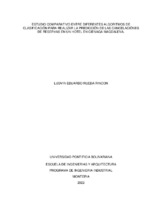| dc.contributor.advisor | López Martínez, Cesar | |
| dc.contributor.author | Rueda Rincón, Ludvin Eduardo | |
| dc.coverage.spatial | Montería | spa |
| dc.coverage.temporal | 2022 | spa |
| dc.date.accessioned | 2023-07-25T20:23:33Z | |
| dc.date.available | 2023-07-25T20:23:33Z | |
| dc.date.issued | 2022-03-02 | |
| dc.identifier.uri | http://hdl.handle.net/20.500.11912/10951 | |
| dc.description | 76 Páginas. | spa |
| dc.description.abstract | Uno de los problemas que se presentan a diario en los hoteles, radica en el hecho
de que los huéspedes hacen una reserva y no se presentan en el hotel. Los
administradores de los hoteles hacen uso del concepto de "Sobre Reservar" las
habitaciones u Overbooking para controlar los efectos negativos de lo anteriormente
explicado. (Pineda, 2015)
Esto es simplemente, la confirmación de más habitaciones que la capacidad
disponible del hotel. De esta forma, se anticipan a las cancelaciones que podrían
realizarse, en lugar de dejar escapar a un cliente cuando el hotel está sin capacidad,
se le sigue brindando una habitación para que, si otro cliente no se presenta, no
permanezca esa habitación libre. Esto ayuda a garantizar que se alcance el máximo
volumen en ingresos y ocupación en el hotel.
Al realizar esta práctica sin ningún control, se pueden incurrir en distintas
ineficiencias. El caso más llamativo es cuando llegan dos clientes a los cuales se
les ha ofrecido la misma habitación, en este punto, las directivas optan por incurrir
en costos adicionales para la reubicación del cliente en otro hotel, además de una
compensación para no disminuir su nivel de servicio, o, por el contrario, en el caso
más extremo, se asume la pérdida del cliente, dañando así su credibilidad.
(RESCO, 2013)
En este punto, es de vital importancia que los hoteleros tengan un nivel de certeza
en saber si un cliente cancelará o no cancelará su reserva. Para tal fin, se propone
implementar técnicas de Aprendizaje Automático o Machine Learning. Este trabajo,
buscó encontrar un algoritmo de clasificación que permitiera determinar con alto
nivel de certeza si un cliente cancelará o no su reserva. Para tal fin se compararon
diferentes algoritmos de clasificación tales como: Arboles de decisión, Clasificador
Bayesiano, Bosques Aleatorios, K vecinos más cercanos y Máquina de soporte
vectorial. Se utilizaron métodos para balancear la base de datos original, puesto
que, en esta, la clase de Cancelaciones se presentaba en menor proporciones. Se
utilizaron los métodos de balanceo Smote y Adasyn.
La métrica para comparar los modelos fue el indicador F1. Bajo este enfoque, se
concluye que los métodos de balanceo utilizados mejoran la capacidad predictiva
de los modelos. El algoritmo máquina de soporte vectorial con kernel radial, fue el
que mejor rendimiento obtuvo, teniendo un alto grado de predicción en la clase
Cancelaciones y reduciendo los falsos positivos. | spa |
| dc.description.abstract | One of the problems that arise daily in hotels lies in the fact that guests make a
reservation and do not show up at the hotel. Hotel administrators make use of the
concept of "Overbooking" rooms or overbooking to control the negative effects of
what has been explained above. (Pineda, 2015)
This is simply the confirmation of more rooms than the available capacity of the hotel.
In this way, they anticipate the cancellations that could be made, instead of letting a
client escape when the hotel is out of capacity, they continue to provide a room so
that if another client does not show up, that room will not remain free. This helps
ensure that the maximum volume of revenue and occupancy is achieved at the hotel.
When carrying out this practice without any control, different inefficiencies can be
incurred. The most striking case is when two clients arrive who have been offered
the same room, at this point, the directors choose to incur additional costs for the
relocation of the client in another hotel, in addition to compensation so as not to
decrease their level. of service, or, on the contrary, in the most extreme case, the
loss of the client is assumed, thus damaging its credibility. (RESCO, 2013)
At this point, it is vitally important that hoteliers have a level of certainty in knowing
whether or not a client will cancel their reservation. For this purpose, it is proposed
to implement Automatic Learning or Machine Learning techniques. This work sought
to find a classification algorithm that would allow determining with a high level of
certainty whether or not a client will cancel their reservation. For this purpose,
different classification algorithms were compared, such as: Decision Trees,
Bayesian Classifier, Random Forests, K Nearest Neighbors, and Support Vector
Machine. Methods were used to balance the original database, since, in this, the
Cancellations class was presented in smaller proportions. The Smote and Adasyn
balancing methods were used.
The metric to compare the models was the indicator F1. Under this approach, it is
concluded that the balancing methods used improve the predictive capacity of the
models. The support vector machine algorithm with radial kernel was the one that
obtained the best performance, having a high degree of prediction in the
Cancellations class and reducing false positives. | spa |
| dc.format.mimetype | application/pdf | spa |
| dc.language.iso | spa | spa |
| dc.rights | Attribution-NonCommercial-NoDerivatives 4.0 Internacional | * |
| dc.rights.uri | http://creativecommons.org/licenses/by-nc-nd/4.0/ | * |
| dc.subject | Sobre reservar, Aprendizaje automático, Curva ROC, Métrica F1 Score, Matriz de confusión. | spa |
| dc.title | Estudio Comparativo Entre Diferentes Algoritmos de Clasificación para Realizar la Predicción de las Cancelaciones de Reservas en un Hotel en Ciénaga Magdalena. | spa |
| dc.type | bachelorThesis | spa |
| dc.publisher.department | ESCUELA DE INGENIERÍAS Y ARQUITECTURA | spa |
| dc.publisher.program | PROGRAMA DE INGENIERÍA INDUSTRIAL | spa |
| dc.type.hasVersion | publishedVersion | spa |
| dc.description.sectional | Montería | spa |
| dc.description.degreename | Trabajo de Grado para Optar al Título de Ingeniero Industrial | spa |


